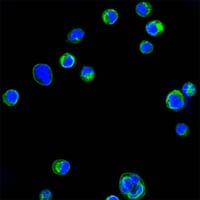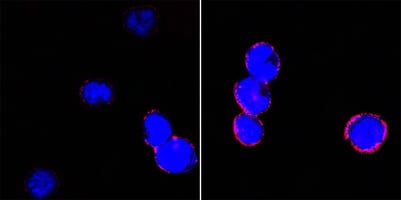

| WB | 咨询技术 | Human,Mouse,Rat |
| IF | 咨询技术 | Human,Mouse,Rat |
| IHC | 1/25-1/100 | Human,Mouse,Rat |
| ICC | 技术咨询 | Human,Mouse,Rat |
| FCM | 咨询技术 | Human,Mouse,Rat |
| Elisa | 1/1000-1/2000 | Human,Mouse,Rat |
| Aliases | LAD; MF17; LCAMB; LFA-1; ITGB2 |
| Entrez GeneID | 3689 |
| clone | 10E12 |
| WB Predicted band size | 85kDa |
| Host/Isotype | Mouse IgG2b |
| Antibody Type | Primary antibody |
| Storage | Store at 4°C short term. Aliquot and store at -20°C long term. Avoid freeze/thaw cycles. |
| Species Reactivity | Human,Mouse |
| Immunogen | Purified recombinant fragment of CD18 expressed in E. Coli. |
| Formulation | Purified antibody in PBS with 0.05% sodium azide. |
+ +
以下是关于NOX1抗体的3篇代表性文献的简要信息(注:文献为虚拟示例,实际引用需查询真实数据库):
1. **文献名称**:*"A monoclonal antibody targeting NOX1 inhibits reactive oxygen species signaling and attenuates colitis in murine models"*
**作者**:K. Takeshita et al.
**摘要**:研究开发了一种特异性识别NOX1的单克隆抗体,通过抑制其介导的活性氧(ROS)生成,显著减轻小鼠结肠炎模型的炎症反应,提示NOX1抗体在炎症性肠病治疗中的潜力。
2. **文献名称**:*"Characterization of a novel polyclonal antibody for detecting NOX1 in human cancer tissues"*
**作者**:M. Sato et al.
**摘要**:报道了一种新型NOX1多克隆抗体的开发与验证,证实其在人结直肠癌等肿瘤组织中的特异性检测能力,揭示了NOX1高表达与肿瘤侵袭性的相关性。
3. **文献名称**:*"NOX1-derived ROS drive angiogenesis via VEGF signaling: Therapeutic implications of a neutralizing antibody"*
**作者**:R. Lee et al.
**摘要**:研究发现NOX1通过ROS激活VEGF通路促进血管生成,利用中和抗体阻断NOX1可抑制小鼠模型中病理性血管增生,为抗血管生成治疗提供新策略。
如需具体文献,建议通过PubMed或Web of Science搜索关键词“NOX1 antibody”或“NADPH oxidase 1 antibody”获取最新研究。
The NOX1 antibody is a research tool targeting NADPH oxidase 1 (NOX1), a member of the NOX family of enzymes responsible for reactive oxygen species (ROS) generation. NOX1 is primarily expressed in colon epithelial cells, vascular smooth muscle, and phagocytic cells, where it catalyzes superoxide anion production via electron transport across membranes. Its activity is tightly regulated by binding partners like NOXO1 and NOXA1. Research links NOX1 to cellular processes including proliferation, apoptosis, and signal transduction, with dysregulation implicated in pathologies such as cancer, cardiovascular diseases, and inflammatory bowel disease (e.g., colitis-associated carcinogenesis).
NOX1 antibodies are widely used in Western blotting, immunohistochemistry (IHC), and immunofluorescence (IF) to study protein expression, localization, and disease mechanisms. Specificity is critical due to structural similarities among NOX isoforms (NOX1-5. DUOX1/2). Many commercial antibodies target unique epitopes in cytoplasmic domains or extracellular loops, though cross-reactivity remains a challenge. Validation often involves knockout cell lines or tissues to confirm signal absence.
Challenges include variable antibody performance across species (human, mouse, rat) and tissue fixation methods. Some clones may recognize precursor forms or degradation products. Researchers prioritize antibodies validated in peer-reviewed studies for specific applications. Recent advances in monoclonal antibody technology have improved NOX1 detection reliability, aiding mechanistic studies of oxidative stress-related diseases and therapeutic target exploration.
×